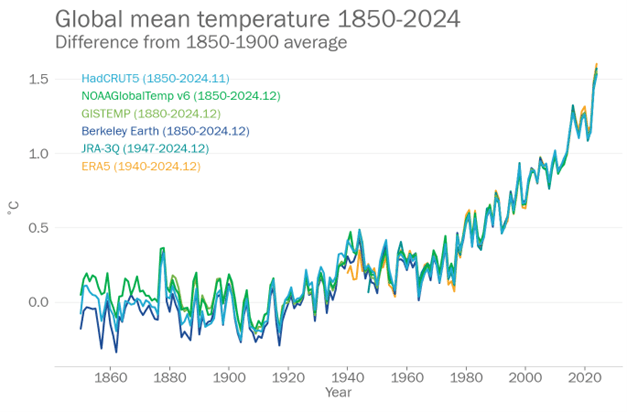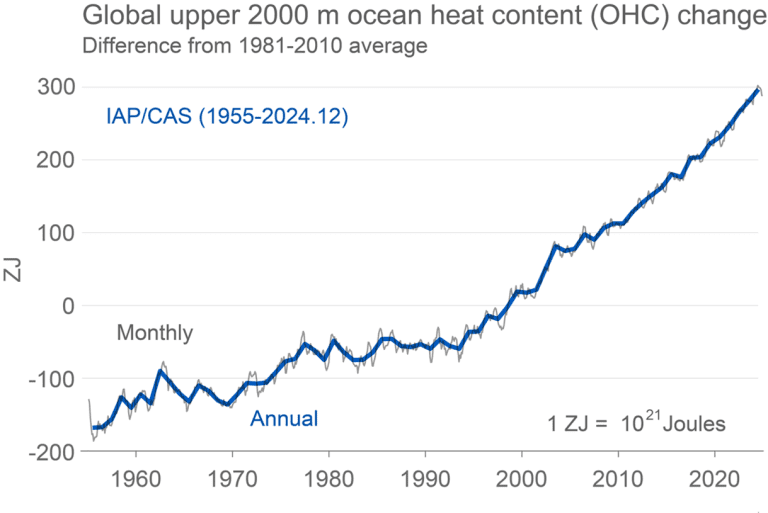The World Meteorological Organization (WMO) has declared 2024 as the hottest year on record, with global average surface temperatures reaching 1.55 °C above pre-industrial levels. The announcement follows an analysis of six leading international datasets, marking a historic breach of the 1.5 °C threshold for a calendar year — a key benchmark in the fight against climate change.

The past ten years, the hottest on record
The past decade, from 2015 to 2024, now ranks as the ten warmest years on record, underscoring the accelerating pace of global warming. “Today’s assessment from the World Meteorological Organization proves yet again — global heating is a cold, hard fact,” said UN Secretary-General António Guterres.
While exceeding the 1.5°C threshold for a single year does not signify the failure of the Paris Agreement’s long-term goals, it highlights the growing urgency for intensified climate action. “Blazing temperatures in 2024 require trail-blazing climate action in 2025,” added Guterres.
Ocean warming plays a critical role
A key factor in 2024’s record-breaking heat was the exceptional warming of the world’s oceans.
According to a study published in Advances in Atmospheric Sciences, the upper 2,000 meters of the ocean stored 16 zettajoules of excess heat from 2023 to 2024 — equivalent to approximately 140 times the world’s total electricity generation in 2023. The study, led by Professor Lijing Cheng with the Institute of Atmospheric Physics at the Chinese Academy of Sciences, found that about 90% of the excess heat from global warming is absorbed by oceans, making them a vital indicator of climate change.

The combined effects of El Niño, greenhouse gas emissions, and heat storage in oceans fueled 2024’s extraordinary temperatures.
WMO Secretary-General Celeste Saulo emphasized that these trends are reshaping climate history. “We’ve had not just one or two record-breaking years, but a full ten-year series. This has been accompanied by devastating and extreme weather, rising sea levels and melting ice, all powered by record-breaking greenhouse gas levels due to human activities.”
Implications for the Paris Agreement
Despite these alarming trends, WMO experts stressed that exceeding 1.5 °C for a single year does not equate to missing the Paris Agreement’s long-term goal of limiting warming to 1.5 °C above pre-industrial levels.
This target applies to extended periods, typically decades or longer. However, Saulo noted that every fraction of a degree matters. “Whether it is at a level below or above 1.5 °C of warming, every additional increment of global warming increases the impacts on our lives, economies and our planet.”
Short-term warming spikes, like 2024’s, are also influenced by natural phenomena such as the El Niño event that lasted from mid-2023 to May 2024.
The WMO’s State of the Global Climate 2024 report, due in March 2025, will provide a comprehensive overview of key climate indicators, including greenhouse gas levels, sea surface temperatures, glacier retreat, and extreme weather events. Meanwhile, Guterres has called on governments to deliver enhanced national climate action plans in 2025 to meet the Paris Agreement’s long-term objectives and protect vulnerable communities.
As the climate crisis intensifies, the message from 2024 is clear: global action must match the unprecedented scale of the challenge.
State of the Global Climate 2024 (video)
Article Source:
Press Release/Material by World Meteorological Organization (WMO)
Featured image credit: Ed Hawkins




